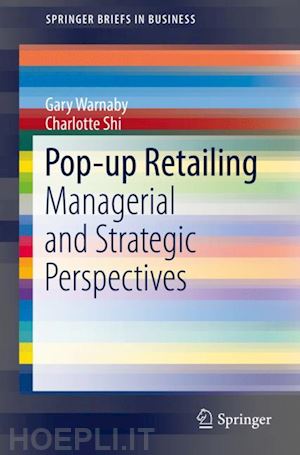
Questo prodotto usufruisce delle SPEDIZIONI GRATIS
selezionando l'opzione Corriere Veloce in fase di ordine.
Pagabile anche con Carta della cultura giovani e del merito, 18App Bonus Cultura e Carta del Docente
Gary Warnaby is Professor of Retailing and Marketing, based in the Institute of Place Management at Manchester Metropolitan University. His research interests focus on the marketing of places and retailing. He is co-author of Relationship Marketing: A Consumer Experience Approach (Sage, 2010), co-editor of Rethinking Place Branding: Comprehensive Brand Development for Cities and Regions (Springer, 2015), and has contributed to numerous edited books.
Charlotte Shi is Lecturer in Fashion Marketing and Branding, based in the School of Art and Design at Nottingham Trent University. Her research is centered on the interdisciplinary approach to marketing and retailing, focusing on the temporal dimensions of retailing. She has published in the Journal of Global Fashion Marketing and contributed to well-known Design and Branding conferences.











Il sito utilizza cookie ed altri strumenti di tracciamento che raccolgono informazioni dal dispositivo dell’utente. Oltre ai cookie tecnici ed analitici aggregati, strettamente necessari per il funzionamento di questo sito web, previo consenso dell’utente possono essere installati cookie di profilazione e marketing e cookie dei social media. Cliccando su “Accetto tutti i cookie” saranno attivate tutte le categorie di cookie. Per accettare solo deterninate categorie di cookie, cliccare invece su “Impostazioni cookie”. Chiudendo il banner o continuando a navigare saranno installati solo cookie tecnici. Per maggiori dettagli, consultare la Cookie Policy.